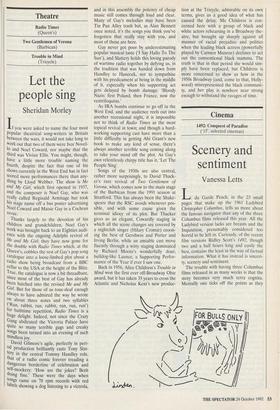Theatre
Radio Times (Queen's) Two Gentlemen of Verona (Barbican) Trouble in Mind (Tricycle)
Let the people sing
Sheridan Morley
If you were asked to name the four most Popular theatrical song-writers in Britain between the wars, it would not take long to work out that two of them were Ivor Novel- lo and Noel Coward, nor maybe that the third was Vivian Ellis. You might, though, have a little more trouble naming the fourth, despite the fact that one of his Shows currently in the West End has in fact scored more performances there than any- thing by Lloyd Webber. The show is Me and My Girl, which first opened in 1937, and the composer is Noel Gay, who was really called Reginald Armitage but took his stage name off a bus poster advertising Noel Coward and Maisie Gay in a Cochran revue.
Thanks largely to the devotion of his Children and grandchildren, Noel Gay's work was brought back to an Eighties audi- ence with the ongoing Adelphi revival of Me and My Girl; they have now gone for the double with Radio Times which, at the Queen's, cobbles the rest of Gay's pop song catalogue into a- loose-limbed plot about a radio show being broadcast from a BBC Cellar to the USA at the height of the Blitz. True, the catalogue is now a bit threadbare, since most of the best of Gay has already been batched into the revised Me and My Girl. But for those of us tone-deaf enough always to have admired the way he wrote on about three notes and two syllables (Run, rabbit, run, rabbit, run, run, run') for bathtime repetition, Radio Times is a huge delight. Indeed, not since the Crazy Gang abdicated the Victoria Palace have quite so many terrible gags and creaky songs been turned into an evening of such Mindless joy. David Gilmore's agile, perfectly in peri- od production brilliantly casts Tony Slat- tery in the central Tommy Handley role, that of a radio comic forever treading a dangerous borderline of celebration and self-mockery: 'How are the jokes? Both doing fine.' These were the days when songs came on 78 rpm records with red labels showing a dog listening to a victrola,
and in this assembly the potency of cheap music still comes through loud and clear. Many of Gay's melodies may have been Tin Pan Alley trash but, as Alan Bennett once noted, it's the songs you think you've forgotten that really stay with you, and most of those are here.
Gay never got poor by underestimating popular musical taste CI Say Hallo To The Sun'), and Slattery holds this loving parody of wartime radio together by defying us, in the tradition that was handed down from Handley to Hancock, not to sympathise with his predicament at being in the middle of it, especially when his supporting act gets delayed by bomb damage: 'Bloody Nazis: first Poland, then France, now the ventriloquists.'
As IRA bombs continue to go off in the West End, and the audience reels out into another recessional night, it is impossible not to think of Radio Times as the most topical revival in town; and though a hard- working supporting cast have more than a little difficulty in getting Abi Grant's new book to make any kind of sense, there's always another terrible song coming along to take your mind off the plot. As Gay's own relentlessly chirpy title has it, 'Let The People Sing'.
Songs of the 1930s are also central, rather more surprisingly, to David Thack- er's rare revival of Two Gentlemen of Verona, which comes now to the main stage of the Barbican from the 1991 season at Stratford. This has always been the Shake- speare that the RSC avoids whenever pos- sible, and with some cause given the terminal idiocy of its plot. But Thacker gives us an elegant, Cowardly staging in which all the scene changes are covered by a nightclub singer (Hilary Cromie) croon- ing the best of Gershwin and Porter and Irving Berlin, while an amiable cast move fluently through a witty staging dominated by Richard Moore's wonderfully dour, bulldog-like Launce, a Supporting Perfor- mance of the Year if ever I saw one.
Back in 1956, Alice Childress's Trouble in Mind won the first ever off-Broadway Obie award, but it has taken 35 years to cross the Atlantic and Nicholas Kent's new produc-
tion at the Tricycle, admirable on its own terms, gives us a good idea of what has caused the delay. Ms Childress is con- cerned here with a group of black and white actors rehearsing in a Broadway the- atre, but brought up sharply against all manner of racial prejudice and politics when the leading black actress (powerfully played by Carmen Munroe) declines to act out the conventional black mamma. The truth is that in that period she would sim- ply have been replaced, but Childress is more concerned to show us how in the 1950s Broadway (and, come to that, Holly- wood) misrepresented the black communi- ty, and her play is nowhere near strong enough to withstand the ravages of time.


































































 Previous page
Previous page